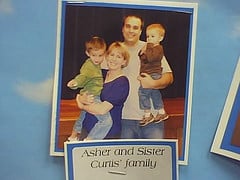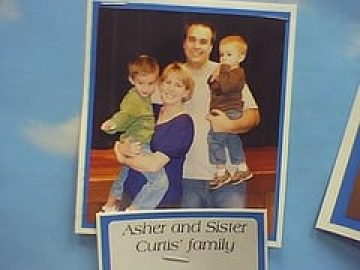By EmilyCC
Last September at our stake training, I started sweating when I heard the theme for Primary this year. I wanted this theme to be one I can embrace, but I’m having a hard time loving it.
I’ll state my bias right off: the eternal family doctrine is an aspect of the Church that I struggle with. Add to that my worry that this theme will make families who are already in tough positions, feel inferior, and well, it feels like a long year.
Still, I’ve been trying to find ways to be true to my feelings and teach the material I’ve been called to teach. In my first post on my Primary dilemma, I mentioned wanting to let our kids know that God loves all families; I asked that we share ideas as they came to us.
I’ve come up with a couple ideas:
1. Our bulletin board: we took pictures of all the kids with their families (see the picture). This shows the kids just how different everyone’s family looks, and we have ready-made pictures of families to use during the year’s sharing times.
As I labeled the families, I ran into a problem–many of our families don’t have the same last names. And, this is where I believe divine inspiration took over (which I have to mention because it doesn’t happen to me that often). Instead of writing, “The Curtis Family,” we wrote, “Asher and Sister Curtis’ Family.” This took care of kids being raised by grandparents, teachers who are dealing with infertility, and single parent households.
We have a girl who isn’t a member but comes to Church every week with a family in the ward. They are “Angela’s Church Family.”
2. PowerPoint Presentation: for the last week of January’s sharing time, I put all these family pictures together with the music, “Families Can Be Together Forever,” interspersed with families from the scriptures and Church history–I was amazed at the diversity there. And, the kids loved seeing their families pop up. Really, it was the quietest they’ve been during sharing time for a while.
If you’re in Primary, how are you handling this year’s theme and sharing times? If you come from a non-traditional family, what would you like your Primary to do to make this year easier?
But, as I start to feel like I’ve figured out how to handle this theme, I realize I’ve got another problem coming up. In a few weeks, I’ll be doing the following sharing times (feel free to ignore my snarking comments in italics, but know that these are the kids in my ward who I’m thinking about when I start preparing these lessons):
1. Fathers preside over, provide for, and protect the family with love (1 Nephi 8:12; “Proclamation,” paragraph 7; GP, chapter 37).
–unless your father is in jail for a violent act…
2. Mothers nurture the family (Alma 56:47– 48; 57:21; “Proclamation,” paragraph 7, GP, chapter 37).
-unless your mom is too strung out on drugs to take care of you, so she drops you off at your grandma’s…
I would argue that the head of the household (whether it’s a parent, grandparent, aunt/uncle, etc.) should embody all those characteristics. Why the need for one sex to have sole claim on important characteristics of parenting?
So, my latest dilemma with this year’s theme: How do I teach something I don’t agree with? Is it possible to be true to my ideals and obedient in my calling?







14 Responses
Emily, great ideas about the powerpoint and bulletin board!
As for the gender role stuff, I would downplay it as much as possible. Maybe really, really emphasize that part that talks about how parents/guardians are to help each other out. And if that means mom working, and dad at home, that’s fine. And as for the kids not living in nuclear families, maybe have a discussion about the ways their guardians help or are helped out by other family members or members of the community. Tie it all back to the fact that we are all one huge human family trying to help one another and love one another, no matter the differences of our families. Talk about the fact that Jesus was part of a blended family, and that he loved people who had all different sorts of families. (woman at the well, widow, etc.) Invite different people in the ward to come and give little talks about the ways their families (non traditional and traditional) loved them and cared for them. Just brainstorming…
I’ve been pondering this because our ward is actually pretty homogeneous–at least on the surface. We’re in a “married student” ward and all the families are young, have both parents, etc. At the same time, I’m sure there is stuff going on at home or in the extended family that I’m not aware of. I’m also worrying about those themes coming up; not sure what I’m going to do. I’m praying about it and still feel torn between the “preach the ideal” (i.e. focus on future families, which seems ridiculous when thinking about 3 or 4 year olds) and “speak to the real” (i.e. focusing too much on what they don’t have). I like the idea of downplaying it as much as possible–talk about dads and all that they do, and included other ‘father figures’ as well. Same for mothers (isn’t the last week of the month about extended family members?)
Last week I ended up with the sharing time on how the priesthood blesses our families, and my daughter is the only one in the Primary with an inactive father. After praying and pondering I just taught a simple sharing time about all the priesthood ordinances (baptism, confirmation, blessings, etc) that we have in our lives and didn’t really talk much about who actually performs the ordinances besides a brief mention that it could be your father, brother, uncle, friend, home teacher, etc.
My sister has taken in many foster children through the years, they come from the roughest of backgrounds. One young man returned for a visit after he had grown up. He thanked my sister and said, “It must be difficult to take in children (and then to see them go back to their same horrible situations), it must be discouraging to try to help them, but please keep doing it. I was only in your home for two days…but for two days, I felt loved, and I understood that there was more, and I wanted that. That gave me hope that someday I could make a home like that.”
We too, are all like foster children on this earth. To learn and know about the ideal family or the perfect plan of our Heavenly Father (even if only for two hours on Sundays) gives us great hope! Children have such strong spirits and this is the time that truth established can bless them forever. Even though we are not all in ideal situations right now, it is still true that Families can be together forever and that if we do our part…we will be in a forever family. Children love that hope, that truth. If our Heavenly Father wants us to know of HIS plan for Happiness…we must teach it or it will not be taught (especially in some homes). There is great kindness in His plan…afterall, He is our Father and His family is forever.
If we water the gospel down, in actuality, it does not tuck anyone in and leaves us wanting for more. Our spirits are resilient and smart. If we share the truth…then we will offer great love and hope. I love that you are so caring. I think the Primary children are blessed to have your love.
Just a thought.
PS How could we come to earth and not want to know the whole truth about why we are here and how to get back. In the end, it is an individual decision, and one primary child can make a huge difference in a family. I know of a man whose hard heart was touched because a child came home and said, “Dad, why can’t we be forever?” It made him weep.
Thanks for this post. I do want to say how grateful I am, EmilyCC, that there are Primary leaders out there like you. I grew up in a non-traditional family myself (parents were divorced and I lived with my Mom and step-dad). I’m now in another non-typical situation (at least in terms of church), as my husband is not LDS. I am expecting my first child (a daughter) very soon and I often think about what she will be taught during Primary about eternal families. I never want her to think that our family is inferior or that God loves her any less. I am glad that you are being so thoughtful and I can only hope that my daughter will run across leaders who make strong efforts to demonstrate the value of all kinds of families.
I think that you can definitely be true to your ideals and your calling at the same time. I agree with Caroline about emphasizing the universality of divine love and the goodness of the human family. I also think that you can somehow bring up, in a sensitive way, that even though circumstances in our lives and families might not always be ideal, that a loving God does have a plan for each one of us– an individual plan, that seeks to provide for our best happiness. Our job is to do the best we can and be the best people we can be in this life and build up our faith that if we do this, then some how, some way, things will eventually be made right. Just a thought. Good luck!
Caroline, great suggestions (as usual)!
FoxyJ, nice work with the PH lesson. One thing I like about sharing time lessons is that there’s very little structure or material that is spelled out as needing to be covered. Does this mean you’ll be off the hook for these upcoming gender sharing times?
Brenda, I love the story about your sister! I think your analogy about foster children is a powerful one. Thanks for sharing!
Sara L., sounds like you’re just the kind of person Primary needs more of. Right now, we have a member of our presidency who grew up in a situation similar to your’s. She’s probably getting sick of me saying, “Yeah, some of us grow up in families with a mom and a dad in the same house. Some of us don’t–like Sister L.” 🙂 Good luck with the birth of your baby!
I’ve found that it helps if you keep in mind that this is the ideal. It gives the children a goal to work towards for their own families when they are grown up. Certainly, in single parent homes one person picks up many roles. You could also emphasize how the child can help in their families (Billy can help remind his mom to have FHE and help prepare it too)…good luck!!!
I am the primary chorister in my ward, and I am using the Salt Lake Temple as a metaphor for families. We’ve talked about the cracks inthe foundation, the dirt thrown on the temple to hide it from the army, and how long it took to build. Then I related that to our families – sometimes we feel like our family is cracked; sometimes we feel covered in dirt and that no one can even see us; sometimes we have this great, ideal family in mind and it seems like it will never happen. But God knows the end from the beginning, and He wants us to succeed and is guiding us to that great ideal of a Godly family.
That’s what I’m doing to address all the diverse family configurations.
Katie, I really like your idea of everyone pitching in in a family to get things done!
Angie, a beautiful metaphor! I think that’ll be in my next sharing time.
1. Are you sure you want to exclude from pictures family members who aren’t at church? Is there any way to include them? Maybe go to their house? Angela has a real family, you know, and it might be really nice for her to have everyone see a pic of her family.
2. I would maybe focus the sharing time on what the qualities the children want to have when they become a mother or a father. You do not have to do a sharing time where you do all the talking. Or even where the children do all the talking. Have them spread themselves around the room on the floor, or in a chair and write an essay or draw a picture of what kind of mother or father they want to be. Let them listen to music. Let them feel the spirit and have time to reflect and think about what they think it means to be a father or a mother.
I like JKS’s comment. I don’t see my primary teaching this year as a way to describe my class members’ families but as a way to help them start thinking about what kind of adults they will be.
In a world where many men abandon families and many women feel like they’ve failed if their primary work is nurturing, I think it’s a good idea to teach children to think ahead about the providing, protecting and nurturing they will do when they are adults and have children in their care (in whatever capacity).
If you want to point out that all these characteristics are needed in all adults, irrespective of gender, that’s fine too. I tend to think that these particular characteristics are mentioned with particular genders simply because many men and women have a hard time having those specific ones as part of their lives successfully, not because those virtues are gender-specific.
(Won’t go into the “preside” thing….that’s a topic that needs much more defining and clarifying before addressing than I have space or time for here and now.)
jks, great point–Angela does have a “real” family, but they speak a language that I don’t. If I get really on top of it, that’s definitely something I will follow up on.
mb, I think you’re right. The gender thing doesn’t matter, but the ideal is a tricky balance. Yes, we want them to know the ideal so they can have that one day, but we also want them to know their family of origin is ok, too.
[…] Closing Angie’s inspired metaphor in her comment from last week’s post: […]
Heavenly Father does indeed love every one of His children, and every family they are in. He wants each one of us to be happy. As the Proclamation states, “By divine design, fathers are to preside over their families in love and righteousness and are responsible to provide the necessities of life and protection for their families. Mothers are primarily responsible for the nurture of their children. In these sacred responsibilities, fathers and mothers are obligated to help one another as equal partners. Disability, death, or other circumstances may necessitate individual adaptation. Extended families should lend support when needed.” This covers all types of families–single parent, grandparents, non-member, part-member, divorce, etc. Families that are striving to follow Heavenly Father’s plan and raise children in righteousness are following the proclamation; it says so when it states that other circumstances necessitate individual adaptation and that extended families should help. As part of one large family, we as neighbors and friends are included, are we not? An eternal family is a celestial principle that we’re teaching in a telestial world, and we need to understand that there’s always hope no matter our circumstances, that we can have an eternal family. As Brenda stated, there is no need to water down gospel principles in fear of offending some. When we teach as Christ did, with love, and with the Spirit, and when we receive by the Spirit there should be no offense given or taken. The gospel is beautiful in its simplicity and the children will see that.